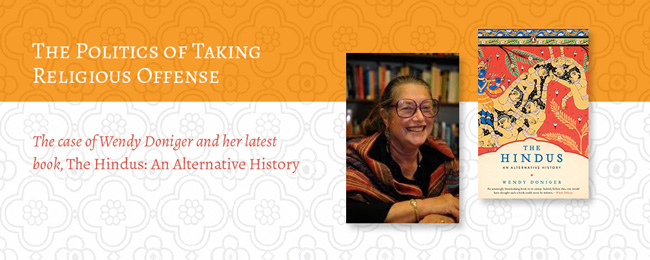
Has University of Chicago historian of religion Wendy Doniger given offense, or has Dinanath Batra, president of the Hindu nationalist group Shiksha Bachao Andolan, taken offense for religious-political purposes? It’s a key question in a case that pits standards of scholarly free inquiry against religious conviction, sentiment, and political aspiration.
Penguin Books in India announced that it will pull Wendy Doniger’s 2009 book The Hindus: An Alternative History from shelves and warehouses in India and destroy them. Penguin’s move comes in response to a lawsuit filed against the publisher in 2011 by Batra’s group.
The suit contends that Doniger’s book, which argues that Hinduism is a historical religion that developed over time from diverse sources, and reads Hindu texts as myth rather than literal history, “has hurt the feelings of millions of Hindus.” The lawsuit also claims that by “[p]lacing the Ramayan in its historical contexts” Doniger declares that the great Hindu epic is fictional. Not surprisingly Batra’s group has described Doniger’s book as “heretical.”
Arundhati Roy, author of the award winning The God of Small Things, wrote a scathing letter to The Times of India criticizing Penguin for not standing up to what she calls an “unknown Hindu fanatic outfit,” and pondered whether she should look for a new publisher. (Penguin also publishes Roy.)
In a brief statement to her supporters Doniger said she does not blame Penguin for their actions. “They were finally defeated by the true villain of this piece—the Indian law that makes it a criminal rather than civil offense to publish a book that offends any Hindu, a law that jeopardizes the physical safety of any publisher, no matter how ludicrous the accusation brought against a book.” Doniger also suggested that the incident might signal a “steadily worsening, political climate” in India.
Time magazine interviewed Batra who likened his group’s action to the response of some in the Islamic world to cartoons of the prophet Mohammad. “If someone makes a cartoon of the prophet Mohammad, Muslims are outraged around the world. So why should anyone write anything against Hinduism and get away with it?”
Batra also told Time that his organization is “against anything that hurts people’s religious sentiments.” Nevertheless, a website associated with Batra’s organization is rife with defamatory remarks about Islam. India’s Hindutuva movement, with which Batra’s group is linked, combines Hinduism with cultural and political nationalism. Its chief current political expression, the Bharatiya Janata Party, seeks to make significant gains in elections this year.
Historical analysis hardly has the final word on any sacred narrative. However, it becomes a problem for democratic societies, not to mention interfaith relations, when respect for religious traditions becomes identified with efforts to safeguard religious texts from any but approved scholarly research. It’s a particularly thorny problem when a mixture of religious and political motives lies behind such efforts.
Images: Background image from The Textile Blog. Book cover and author image courtesy of Google Images.
Like this post? Subscribe to have new posts sent to you by email the same day they are posted.



Leave a Reply